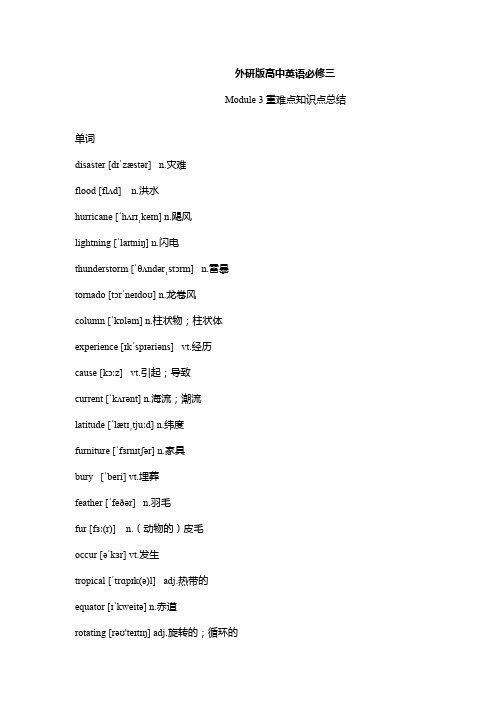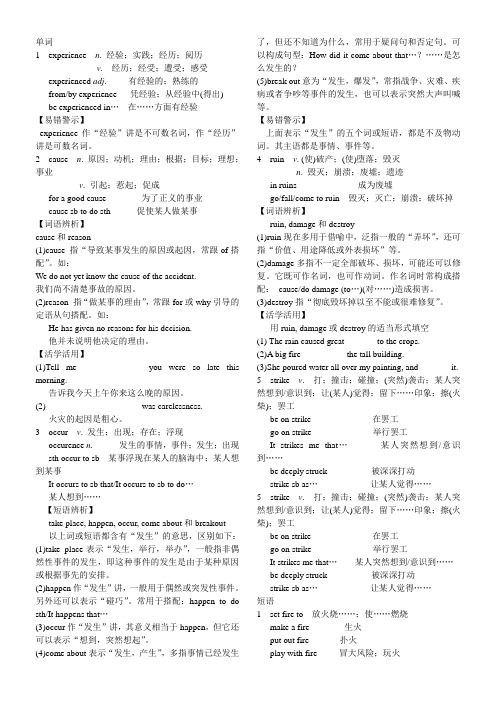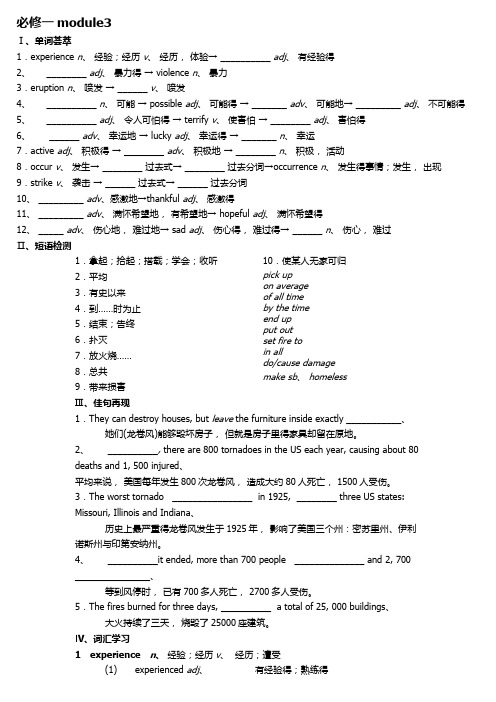外研版必修三module3重点知识与练习培训资料
- 格式:doc
- 大小:107.00 KB
- 文档页数:8

外研版高中英语必修三Module 3重难点知识点总结单词disaster [dɪˈzæstər] n.灾难flood [flʌd] n.洪水hurricane [ˈhʌrɪˌkeɪn]n.飓风lightning [ˈlaɪtniŋ]n.闪电thunderstorm [ˈθʌndərˌstɔrm] n.雷暴tornado [tɔrˈneɪdoʊ]n.龙卷风column [ˈkɒləm]n.柱状物;柱状体experience [ɪkˈspɪəriəns] vt.经历cause [kɔːz] vt.引起;导致current [ˈkʌrənt]n.海流;潮流latitude [ˈlætɪˌtjuːd]n.纬度furniture [ˈfɜrnɪtʃər]n.家具bury [ˈberi]vt.埋葬feather [ˈfeðər] n.羽毛fur [fɜː(r)] n.(动物的)皮毛occur [əˈkɜr]vt.发生tropical [ˈtrɑpɪk(ə)l] adj.热带的equator [ɪˈkweitə]n.赤道rotating[rəʊ'teɪtɪŋ]adj.旋转的;循环的violent [ˈvaɪələnt] adj.猛烈的,激烈的wave [weɪv] n.波浪strike [straɪk] vt.& n.(雷电、暴风雨等)袭击cemetery [ˈseməˌteri]n.墓地;公墓coffin [ˈkɑfɪn] n.棺材ruin [ˈruɪn]vt.毁坏ash [æʃ] n.灰erupt [ɪˈrʌpt] vt.(火山的)爆发;喷发lava [ˈlɑːvə]n.熔岩;岩浆tidal [ˈtaɪd(ə)l] adj.受潮水影响的;有涨落的volcano [vɒlˈkeɪnəʊ]n.火山previous [ˈpriːviəs] adj.以前的eruption [ɪˈrʌpʃn]n.(火山的)爆发;喷发possibility [ˌpɒsəˈbɪləti] n.可能;可能性earthquake [ˈɜrθˌkweɪk]n.地震terrifying [ˈterəˌfaɪɪŋ] adj.吓人的;可怕的luckily [ˈlʌkɪli]adv.幸运地thankfully [ˈθæŋkf(ə)li]adv.感激的;满怀的hopefully [ˈhoʊpfəli]adv.满怀希望的sadly [ˈsædli] adv.伤心地fortunately [ˈfɔrtʃənətli]adv.幸运地warning [ˈwɔrnɪŋ] n.警告worldwide [ˈwɜrldˌwaɪd] adj.全世界的active [ˈæktɪv] adj.积极的;活跃的damage [ˈdæmɪdʒ] n.&v.损失;损害短语1.be experienced in/at 在……方面有经验2. sth.occurs to sb. 某事被某人想起it occurs to sb. + that 某人突然想到……it occurs to sb. to do sth. 某人突然想到做某事3. strike sb.+介词+the +具体部位打某人的某个部位strike sb. on the back 打某人的背be struck by 被……所袭击;被……所迷惑4.bury oneself in 埋头于;专心致志于5.pick up 捡起;获得;接(人)6.end up 结束7.by the time 到……的时候(常与完成时连用)8. on the same latitude 在同一纬度9. refer to 指代;参考10. on average 平均11. of all time 有史以来12. in ruins 成为废墟;严重受损13. fall into ruins 已成废墟bring sb. to ruin 毁灭某人14.warn sb. (not) to do sth. 警告某人(不)干某事warn sb. of sth. 警告某人当心某事15.at all 完全;究竟;根本16.see sb.do sth. 看见某人干了某事see sb.doing sth. 看见某人正在干某事句型1.Buried/Absorbed in his study, he didn’t know that all the others had left.他埋头学习,不知道其他人都早已离开了。


单词1experience n. 经验;实践;经历;阅历v. 经历;经受;遭受;感受experienced adj. 有经验的;熟练的from/by experience 凭经验;从经验中(得出)be experienced in…在……方面有经验【易错警示】experience作“经验”讲是不可数名词,作“经历”讲是可数名词。
2cause n. 原因;动机;理由;根据;目标;理想;事业v. 引起;惹起;促成for a good cause为了正义的事业cause sb to do sth 促使某人做某事【词语辨析】cause和reason(1)cause 指“导致某事发生的原因或起因,常跟of搭配”。
如:We do not yet know the cause of the accident.我们尚不清楚事故的原因。
(2)reason 指“做某事的理由”,常跟for或why引导的定语从句搭配。
如:He has given no reasons for his decision.他并未说明他决定的理由。
【活学活用】(1)Tell me _______________you were so late this morning.告诉我今天上午你来这么晚的原因。
(2)______________________was carelessness.火灾的起因是粗心。
3occur v. 发生;出现;存在;浮现occurence n. 发生的事情,事件;发生;出现sth occur to sb 某事浮现在某人的脑海中;某人想到某事It occurs to sb that/It occurs to sb to do…某人想到……【短语辨析】take place, happen, occur, come about和breakout以上词或短语都含有“发生”的意思,区别如下:(1)take place表示“发生,举行,举办”,一般指非偶然性事件的发生,即这种事件的发生是由于某种原因或根据事先的安排。

高一英语必修3 module3知识点总结及课后练习重点短语总结1.be caught in【课文原句】"To have been caught in a sandstorm was a terrible experience,"...(Page 32)be caught in 此处意为"遭遇上"。
如:I was caught in the downpour on the way home from school.常用搭配: a.catch sb doing 偶然发觉某人做某事如:The teacher caught him sleeping in class.b. catch up with 赶上如:You’ll have to work harder to catch up with the top students.2.take in,give out【课文原句】Trees take in carbon dioxide and give out oxygen. (Page 35)a.take in "吸收,吸入(空气、水等)"。
如:Take in a deep breath.把……拿进如:Please take your clothes in in case it rains.收容(留)某人住宿。
如:The teacher took in several students.b.give out "放出,散发出", 多指气味、热量等的释放。
如:The rotating machine gave out a lot of heat.发(书、报)等。
如:The teacher gave out the exam papers.用完,耗尽如:After five months, their food supply finally gave out.3.cut down,dig up【课文原句】This is a process that happens when land becomes desert because of climate changes and because people cut down trees and dig up trees. (Page 32)a.cut down "砍倒" 如:They cut down many old trees and planted some young trees."削减,删减" 如:Your article is too long, so please cut it down to 500 words.b.dig up "从地里挖出(某物)" 如:We dug up the tree by its roots."掘到,掘出" 如:An old vase was dug up here last month.4.relate v. 有关;涉及;叙述He related the story at length.他把故事详细的叙述了一遍。

考点分布备考指南1.重点单词如experience, bury, occur等的识记、理解、固定搭配。
词汇和短语的理解和记忆不是孤立的,需要结合具体的句子和语境进行准确理解,掌握其基本用法和固定搭配。
同时要对所学单词和短语进行多方面的应用,及时复习巩固。
2.词性转化、固定搭配在语法填空、短文改错中的考查。
3.重点短语如pick up, end up等的理解及应用。
disaster n [,di'zɑ:stə] 灾难flood n [flʌd] 洪水hurricane n ['hʌrikən] 飓风lightning n ['laitniŋ] 闪电thunderstorm n ['θʌndəstɔ:m] 雷暴tornado n [tɔ:'neidəu] 龙卷风column n ['kɔləm] 柱状物;柱状体experience vt [ik'spiəriəns] 经历cause vt [kɔ:z] 引起;导致current n ['kʌrənt] 海流;潮流latitude n ['lætitju:d] 纬度furniture n ['fə:nitʃə] 家具bury vt ['beri] 埋葬feather n ['feðə] 羽毛fur n [fə] (动物的)毛皮occur vi [ə'kə:] 发生tropical adj ['trɔpikəl] 热带的equator n [i'kweitə] 赤道rotating adj旋转的;循环的violent adj ['vaiələnt] 猛烈的;激烈的;强烈的wave n [weiv] 波浪strike vt& n [straik] (struck; striken)(雷电、暴风雨等)袭击cemetery n ['semitəri] 墓地;公墓coffin n ['kɔfin] 棺材ruin vt[‘ruin]毁坏ash n [æʃ] 灰erupt vt [i'rʌpt] (火山的)爆发;喷发lava n ['lɑ:və ] 熔岩;岩浆tidal adj ['taidəl] 受潮水影响的;有涨落的专题解读知识清单单词和短语必修三M3M3单词表volcano n [vɔl'keinəu] 火山previous adj ['pri:vjəs] 以前的eruption n [i'rʌpʃən](火山的)爆发;喷发possibility n [,pɔsə'biləti] 可能;可能性earthquake n ['ə:θkweik] 地震terrifying adj ['tərifaiiŋ]吓人的;可怕的luckily adv ['lʌkili] 幸运地;幸亏thankfully adv ['θæŋkfulli] 感激地;满怀感谢地hopefully adv ['həupfuli] 满怀希望地;有希望地sadly adv ['sædli] 伤心地;不幸地fortunately adv ['fɔitʃənitli] 幸运地;幸亏warning n ['wɔ:niŋ] 警告worldwide adj ['wə:ld,waid] 全世界的active adj ['æktiv] 积极的;活跃的damage n& v ['dæmidʒ] 损失;损害M3短语pick up 卷起;掀起take off 去掉on average 平均起来end up 以……结束set fire to 放火(焚烧)……catch fire 着火put out 扑灭(火)take place 发生in all 总共;总计项目单词及其词性变化(语法填空必备)重点单词1.disaster n. 灾难2.cause vt. 引起;造成3.bury vt. 埋葬4.occur vi. 发生5.strike vt.& n. (雷电、暴风雨等)袭击6.ruin vt. 毁坏7.active adj. 积极的;活跃的8.damage n.& v. 损失;损害9.experience vt.经历→experienced adj.有经验的10.furniture n.家具→furnish vt.装备;配备11.violent adj.猛烈的;激烈的;强烈的→ violence n.暴力12.possibility n.可能;可能性→possible adj.可能的→impossible adj.不可能的13.terrifying adj.吓人的;可怕的→terrified adj.感到害怕的→terrify vt.使害怕14.luckily adv.幸运地;幸亏→lucky adj.幸运的→luck n.运气15.thankfully adv.感激地;满怀感谢地→thankful adj.感激的16.warning n.警告→warn v.警告重点短语1.pick_up卷起;掀起;拾起;接(某人);偶然学会;情况转好2.take_off 去掉;脱掉;起飞3.on_average 平均起来4.end_up 结果为……;以……结束5.set_fire_to 放火(焚烧)……6.catch_fire 着火7.put_out 扑灭(火);生产;制造8.take_place 发生,进行9.plenty_of 许多;大量10.in_all 总共;总计单元知识预览重点单词短语精讲1.experience vt.经历;体验n.经历;经验[教材原句]Do you know anyone who has experienced one of the events?你认识曾经经历过其中一种事件的人吗?experience in/of在……方面的经验by/from experience 通过经验,从经验中experienced adj. 有经验的;熟练的be experienced in 在……方面有经验[例句研读]①From/In my experience, there are three main reasons why people don't cook more often: ability, money, and time.根据我的经验看,人们不经常做饭主要有三个原因:能力、金钱和时间。

必修一module3Ⅰ、单词荟萃1.experience n、经验;经历v、经历,体验→ __________ adj、有经验得2、________ adj、暴力得→ violence n、暴力3.eruption n、喷发→ ______ v、喷发4、__________ n、可能→ possible adj、可能得→ _______ adv、可能地→ _________ adj、不可能得5、__________ adj、令人可怕得→ terrify v、使害怕→ ________ adj、害怕得6、 ______ adv、幸运地→ lucky adj、幸运得→ _______ n、幸运7.active adj、积极得→ ________ adv、积极地→ ________ n、积极,活动8.occur v、发生→ ________ 过去式→ ________ 过去分词→occurrence n、发生得事情;发生,出现9.strike v、袭击→ ______ 过去式→ ______ 过去分词10、 _________ adv、感激地→thankful adj、感激得11、 _________ adv、满怀希望地,有希望地→ hopeful adj、满怀希望得12、 _____ adv、伤心地,难过地→ sad adj、伤心得,难过得→ ______ n、伤心,难过Ⅱ、短语检测1.拿起;拾起;搭载;学会;收听2.平均3.有史以来4.到……时为止5.结束;告终6.扑灭7.放火烧……8.总共9.带来损害10.使某人无家可归pick upon averageof all timeby the timeend upput outset fire toin alldo/cause damage make sb、 homelessⅢ、佳句再现1.They can destroy houses, but leave the furniture inside exactly ___________、她们(龙卷风)能够毁坏房子,但就是房子里得家具却留在原地。
⾼中英语外研版新教材必修三Unit3重点单词词组语法总结必修三Unit 3⼀、重点语法知识讲解:1.the way+定语从句:the way+(that/in which)定语从句eg. What surprised me was not what he said but the way that/in which he said it.the way⽤作连词,相当于as,引导⽅式状语从句,翻译成按照,正如eg. He fought for the equal rights of the black people the way he wanted.the way引导名词性从句,相当于how,如何,怎样eg.I don’t know the way Tom survived such a big fire.2.find+宾语+宾补:发现/觉得---怎么样find+名词+介词短语/形容词/副词/名词find+名词+现在分词:表⽰主动或正在进⾏find+名词+过去分词:表⽰被动或已经完成find +it+宾补+不定式:it是形式宾语,不定式是真正宾语3.强调句型:It is/was+被强调部分+that+其他部分⼀般疑问句:Is/Was it+被强调部分+that+其他部分?特殊疑问句:疑问词+is/was it that+其他部分?注意:it不能⽤其他词代替;⽤is 还是was根据原句的时态⽽定,属于现在或将来时间⽤is,属于过去时态的⽤was;去掉itis/was和that,适当调整语序,能还原成完整的句⼦。
4.what引导的主语从句+is +that引导的表语从句:1)what引导主语从句时在从句中充当主语、宾语、表语等成分;what在具体语境中表⽰⼀定的具体意义2)that引导主语从句时,在从句中不作任何成分,没有实际意义,只起连接作⽤,不能省略3)which引导主语从句,表⽰哪⼀个,通常有⼀个可以选择的范围。
精品文档必修一module3Ⅰ.单词荟萃1.experience n. 经验;经历v. 经历,体验→ __________ adj. 有经验的2. ________ adj. 暴力的→ violence n. 暴力3.eruption n. 喷发→ ______ v. 喷发4. __________ n. 可能→ possible adj. 可能的→ _______ adv. 可能地→ _________ adj. 不可能的5. __________ adj. 令人可怕的→ terrify v. 使害怕→ ________ adj. 害怕的6. ______ adv. 幸运地→ lucky adj. 幸运的→ _______ n. 幸运7.active adj. 积极的→ ________ adv. 积极地→ ________ n. 积极,活动8.occur v. 发生→ ________ 过去式→ ________ 过去分词→occurrence n. 发生的事情;发生,出现9.strike v. 袭击→ ______ 过去式→ ______ 过去分词10. _________ adv.感激地→thankful adj. 感激的11. _________ adv. 满怀希望地,有希望地→ hopeful adj. 满怀希望的12. _____ adv. 伤心地,难过地→ sad adj. 伤心的,难过的→ ______ n. 伤心,难过Ⅱ.短语检测1.拿起;拾起;搭载;学会;收听2.平均3.有史以来4.到……时为止5.结束;告终6.扑灭7.放火烧……8.总共9.带来损害10.使某人无家可归pick upon averageof all timeby the timeend upput outset fire toin alldo/cause damage make sb. homelessⅢ.佳句再现1.They can destroy houses, but leave the furniture inside exactly ___________.他们(龙卷风)能够毁坏房子,但是房子里的家具却留在原地。
外研社版高中英语必修三-Module-3-基础知识整理单词派生:flood-flooding-floodedlighting-light-lit-lightedcurrent-currently-currencyrotating-rotateviolent-violently-violenceash-ashtraytidal-tidevolcano-volcanicerupt-eruptionterrifying-terrify-terrifiedluckily-luck-lucky-unluckythankfully-thank-thanks-thankfulhopefully-hopeful-hope-hopeless-hopelesslysadly-sadfortunately-fortunate-fortunewarning-warnworldwide-worldactive-act -actor-actressdamage-damagedpossibility-possible-impossible-impossibilityexperience-experiencedput outin all/ all in all/ after all/on average单词:1.experience vt.经历,体验;感受到n.经历经验experienced adj.有经验的;熟练的Besides relaxing with these more commonentertainments, astronauts can simply enjoy the experience of living in space.(2012?辽宁阅读B)除了用这些更为常见的娱乐放松之外,宇航员还可以尽情体验在太空中的生活。
(经验)a teacher with much experience/ (经历)a very interesting experiencefrom/by experience凭经验;从经验中(得出)have experience in ... 有……的经验/经历be experienced in ... 在……方面有经验full of experiencein one’s experience 根据某人的经验来看He has much experience in teaching.他有丰富的教学经验。
外研版必修三m o d u l e3重点知识与练习精品文档必修一module3Ⅰ.单词荟萃1.experience n. 经验;经历v. 经历,体验→ __________ adj. 有经验的2. ________ adj. 暴力的→ violence n. 暴力3.eruption n. 喷发→ ______ v. 喷发4. __________ n. 可能→ possible adj. 可能的→ _______ adv. 可能地→ _________ adj. 不可能的5. __________ adj. 令人可怕的→ terrify v. 使害怕→ ________ adj. 害怕的6. ______ adv. 幸运地→ lucky adj. 幸运的→ _______ n. 幸运7.active adj. 积极的→ ________ adv. 积极地→ ________ n. 积极,活动8.occur v. 发生→ ________ 过去式→ ________ 过去分词→occurrence n. 发生的事情;发生,出现9.strike v. 袭击→ ______ 过去式→ ______ 过去分词10. _________ adv.感激地→thankful adj. 感激的11. _________ adv. 满怀希望地,有希望地→ hopeful adj. 满怀希望的12. _____ adv. 伤心地,难过地→ sad adj. 伤心的,难过的→ ______ n. 伤心,难过Ⅱ.短语检测1.拿起;拾起;搭载;学会;收听2.平均3.有史以来4.到……时为止5.结束;告终6.扑灭7.放火烧……8.总共9.带来损害10.使某人无家可归pick upon averageof all timeby the timeend upput outset fire toin alldo/cause damage make sb. homelessⅢ.佳句再现1.They can destroy houses, but leave the furniture inside exactly ___________.他们(龙卷风)能够毁坏房子,但是房子里的家具却留在原地。
2. __________, there are 800 tornadoes in the US each year, causing about 80 deaths and 1, 500 injured.平均来说,美国每年发生800次龙卷风,造成大约80人死亡, 1500人受伤。
3.The worst tornado ________________ in 1925, ________ three US states: Missouri, Illinois and Indiana.历史上最严重的龙卷风发生于1925年,影响了美国三个州:密苏里州、伊利诺斯州和印第安纳州。
4. __________it ended, more than 700 people ______________ and 2, 700 _______________.等到风停时,已有700多人死亡, 2700多人受伤。
5.The fires burned for three days, __________ a total of 25, 000 buildings.大火持续了三天,烧毁了25000座建筑。
Ⅳ.词汇学习1experience n. 经验;经历v. 经历;遭受(1) experienced adj. 有经验的;熟练的(2) from/by experience 凭经验;从经验中(得出)be experienced in 在……方面有经验【温馨提示】experience作“经验”讲是不可数名词,作“经历”讲是可数名词。
【活学活用】布朗先生有丰富的教学经验。
(2) Yesterday afternoon I had __________________.昨天下午,我遭遇了一次可怕的经历。
(3) Everyone _______________________ at some time in their lives.每个人在人生的某个阶段都会经历这些问题。
2cause n. 原因,起因;事业v. 引起,导致for a good cause为了正义的事业cause sb. to do sth. 促使某人做某事【易混辨析】cause和reason(1)cause 指“导致某事发生的原因或起因”,常跟of搭配。
如:We do not yet know the cause of the accident. 我们尚不清楚事故的原因。
(2)reason 指“做某事的理由”,常跟for或why引导的定语从句搭配。
He has given no reasons for his decision. 他并未说明他决定的理由。
【活学活用】(1)Tell me ______________ you were so late this morning.告诉我今天上午你来这么晚的原因。
(2) _________________ was carelessness. 火灾的起因是粗心。
3occur v. 发生;(come into one’s mind)(想法、念头等)出现(1) occurrence n. 发生的事情、事件;发生;出现(2) sth. occur to sb. 某事浮现在某人的脑海中;某人想到某事It occurs to sb. that/It occurs to sb. to do…某人想到……【易混辨析】take place, happen, occur, come about和break out以上词或短语都含有“发生”的意思,区别如下:(1)take place表示“发生,举行,举办”,一般指非偶然性事件的发生,即这种事件的发生是由于某种原因或根据事先的安排。
(2)happen作“发生”讲,一般用于偶然或突发性事件。
另外还可以表示“碰巧”。
常用于搭配:happen to do sth./It happens that…(3)occur作“发生”讲,其意义相当于happen, 但它还可以表示“想到,突然想起”。
(4)come about表示“发生,产生”,多指事情已经发生了,但还不知道为什么,常用于疑问句和否定句。
可以构成句型:How did it come about that…?……是怎么发生的?(5)break out意为“发生,爆发”,常指战争、灾难、疾病或者争吵等事件的发生,也可以表示突然大声叫喊等。
【温馨提示】上面表示“发生”的五个词或短语,都是不及物动词。
其主语都是事情、事件等。
【活学活用】(1) The 28th Olympic Games _________ in Beijing. 第28届奥运会在北京举行。
(2) How did it __________that he knew where we were?他是怎么知道我们在什么地方的呢?(3) Should another world war ________, what would become of human beings?万一另一次世界大战爆发,人类将会发生什么事?(4) I __________________on my way home.= _______________ I saw him on my way home. 我碰巧在回家的路上见到了他。
(5) ________________ that you may be wrong?你有没有想到过你有可能是错的?4 ruin v. (使)破产;(使)堕落;毁灭n. 毁灭;废墟in ruins成为废墟 go/fall/come to ruin 毁灭;崩溃;破坏掉【易混辨析】ruin, damage, destroy和harm(1) ruin 一般指对物体或生命彻底的破坏,但往往是非暴力的,也往往不是一次性打击的结果,常指对美好的或希望中的事物的破坏。
(2) damage 一般指对物体或生命的局部损伤,使整体的价值或作用降低或变得无价值、无作用。
它既可作名词,也可作动词。
作名词时常构成搭配: cause/do damage (to…)(对……)造成损害。
(3) destroy 往往指对某物体进行完全的毁坏,使之无法恢复。
(4) harm 一般指伤害有生命的东西,常指伤及人的健康、权利、事业等。
What he faced ruined his hope. 他所面对的使他的希望破灭了。
The whole city was destroyed in the earthquake. 整个城市在地震中被毁掉了。
We wanted to have a look at the ruins of Pompeii. 我们想看一下庞贝城的废墟。
They managed to repair the houses that had been damaged.他们设法修复了受到破坏的房子。
【活学活用】用ruin, damage或destroy的适当形式填空(1)The rain caused great ________ to the crops.(2)The building was completely ________ in the fire.(3)She poured water all over my painting, and ________ it.5strike v. 打;碰撞; (突然)袭击;突然想到;让(某人)觉得,留下……印象;擦(火柴);钟敲响n. 罢工It strikes me that…某人突然想到/意识到…… be deeply struck 被深深打动strike sb. as… 让某人觉得…… be on strike 在罢工go on strike 举行罢工【易混辨析】strike, hit和beat(1) strike指用力地“打击”,表示短暂的动作,含有急速的或突然的一次性的殴打、打击或敲击,是普通用词,有时与hit通用,并用于比喻意义。
(2) hit 指“打”时,侧重于对某一点“打中,击中”,或有目的地打,表结果。
(3) beat 指“连续殴打,击败”,也指心脏的“跳动”。
【活学活用】1. 根据语境判断strike在下列句中的含义(1)The plan strikes me as ridiculous. ___________(2)His knee struck against the chair. ________(3)It was dark in the room so he struck a match. ________(4)An earthquake struck this area last year. ________(5)A good idea struck me and I decided to go abroad. ________2. 用beat, hit或strike的适当形式填空(1)When she heard the bad news, her heart _____ fast.(2)They left the house when the clock ______ twelve.(3)I was deeply ______ by the beauty of the country.(4)It ______ me that there was no one at home.(5)A bullet ___ him on the leg.Ⅴ短语学习1set fire to放火烧……;使……燃烧set… on fire 放火烧;使燃烧 catch fire着火;起火be on fire燃烧着 make a fire生火put out fire 扑火 play with fire 冒大风险;玩火【活学活用】(1)It took firemen several hours ________________ (扑灭火).(2)It seems that something ______________ (已经着火).(3)The house _______ (在燃烧).(4)Anyone who _________ (放火烧) the building can’t escape punishm ent.2take place发生;举行take sb.’s place/take the place of 代替;接替in place of 代替 in place在正确的位置;适当out of place 在错误的位置;在不适当的位置in sb.’s place 处于某人的位置【活学活用】(1)The contest __________ every four years. 该赛事每4年举行一次。